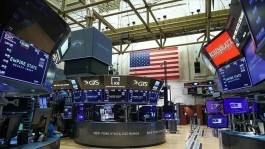Asian stocks fell on Tuesday, after losses on Wall Street, amid concerns that strong bets on the Federal Reserve halting monetary tightening may be overly optimistic.
The region's stock index was on track for a third daily decline, with major indexes in Hong Kong and Japan falling further. US futures also fell, after yesterday's declines on Monday, when the S&P 500 index fell from its highest level since March 2022.
The yen stabilized after initially declining as inflation data in Tokyo slowed more than expected. This development supports the Bank of Japan's view that price pressures are currently weakening and its continued caution regarding policy tightening. Today, investors will also be watching the sale of 10-year Japanese government bonds.
The position of the Chinese economy
Treasuries were little changed in Asia after a decline in the previous session added nine basis points to the two-year yield. The dollar witnessed stability yesterday, Monday, while Bitcoin, which was hovering near $42,000, rose after feverish speculation in cryptocurrencies.
Chinese stocks briefly trimmed losses after PMI data beat estimates, accelerating their expansion in November. Major indices remained firmly in the red, as the pace was not enough to dispel concerns about the economy. Investors see a lack of catalysts to pull the market out of recession.
Yan Wang, chief emerging markets expert and China strategist at Alpine Macro Inc, said in statements to Bloomberg TV, speaking about China's economy: The economy has been very slow with continued lack of confidence. He added: As we enter the new year, the path will not improve much if there is no major change regarding official stimulus.
US jobs data
US jobs data later in the week will help determine the likelihood of a soft landing in the world's largest economy, as investors price in interest rate cuts in 2024. A cut of nearly 125 basis points is being priced in during Fed meetings through December next year.
Markets are approaching the limits of what can be reasonably priced without placing significant odds on a near-term recession, Goldman Sachs strategists, including Praveen Korapati, wrote.
US stocks are headed toward a tough end to the year, according to Michael Wilson, a strategist at Morgan Stanley, who said December could bring near-term volatility in both interest rates and stocks ahead of more constructive seasonal trends, in addition to the January effect that supports stocks. next month.
The Fed's next steps could help reignite volatility, which has recently shown signs of weakening. Overbought conditions and long positions have left the markets vulnerable to a correction, following historic rises in both stocks and Treasuries last month.
“The consolidation period, which is a necessary breather after an exceptional one-month rally, is the biggest risk facing markets in the near term,” said Jason Draho, of UBS Global Wealth Management. He added: Investors have calculated a lot of good news, and see little imminent downside risk, which makes markets vulnerable to disappointments, even if they are small.
S&P 500 index trading above its 50-day moving averages has risen to 84%, indicating broad participation during the recent rally, according to data compiled by Bespoke Investment Group. At the same time, the percentage of difference between optimists and pessimists in the opinion poll of the American Individual Investors Association showed a more optimistic position on the part of investors since July, bringing the percentage close to levels not seen since April 2021.
All eyes will be on Friday's monthly jobs report to see if it confirms the slowing trend we've seen for most of the past month, said Chris Larkin of Morgan Stanley's E-Trade. He added: If this does not happen, this may renew concerns that the Fed's 2024 pivot point for interest rate cuts could be delayed.
On the other hand, oil stabilized after a three-day loss, as Saudi Arabia said that the recent cuts announced by OPEC+ will be fully adhered to and could be extended. Gold also rebounded after the sales yesterday, Monday, when it touched a new record level at the beginning of trading.





































